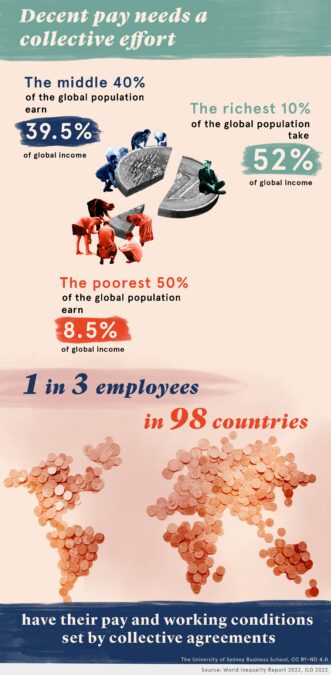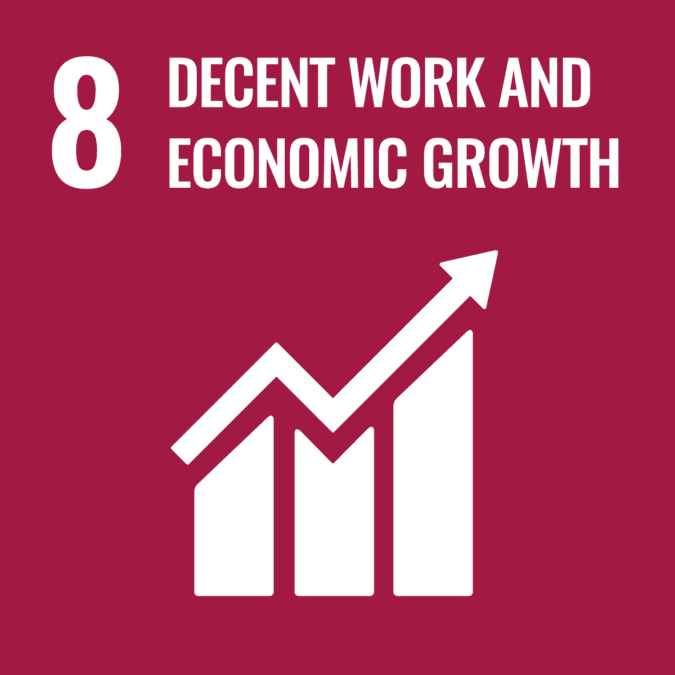
SDGs by 2030 – are we on track?
Decent work is a collective effort
The United States has one of the largest income gaps in the developed world. While the bottom 50 percent earn an average of US$20,520 per person, the top 10 percent of earners receive 17 times more, with an average income of US$350,440. In Europe this ratio between the top 10 percent and bottom 50 percent ranges between 6 to 10.
The United States also has the lowest ratio of workers covered by collective bargaining, with barely 12 percent of workers having their employment terms negotiated collectively. In contrast, countries like Italy and France, where almost every worker’s employment rights are collectively bargained, have some of the smallest income gaps in the world. This suggests a strong correlation between collective bargaining coverage and income equality.
Ensuring workers receive their fair share of their country’s wealth is a key concern of Sustainable Development Goal 8, which aims to promote sustained, inclusive, and sustainable economic growth, full and productive employment, and decent work for all. My research investigates the link between the institutions that regulate employment and decent work.

Increased income inequality and insecure employment are tangible examples of the erosion of workers’ rights in recent decades. This helps to explain why the income gap between those at either end of the corporate ladder has widened in the past 30 years. The weakening of labour rights, particularly in countries with minimal collective bargaining, has contributed to the growing disparity in income and job security.
Addressing these issues involves strengthening labour rights and ensuring fair employment practices. By enhancing the coverage and effectiveness of collective bargaining, and implementing policies that protect workers’ rights, it is possible to reduce income inequality and promote decent work. This, in turn, supports the goals of SDG 8, fostering a more equitable distribution of wealth and improving economic stability for all workers.
According to the International Labour Organization, protecting labour rights, including access to collective bargaining, is vital for achieving the decent work targets envisaged in SDG 8. Collective bargaining allows workers, usually through a trade union, to negotiate wages and conditions jointly with their employer. Workers covered by collective bargaining are more likely to receive higher wages, better working conditions and access good quality jobs, according to OECD research.
Collective bargaining coverage has been declining in Australia and other liberal market economies like the United States, which prioritise employers’ interests and provide little institutional backing for workers to negotiate better wages and working conditions. In practice this means the state provides very little support in terms of legal minimum wages and working conditions, leaving workers alone to negotiate with their employer over all aspects of their employment arrangements. In these countries, worker representatives such as trade unions have limited power to support workers in their negotiations with employers. This has contributed to low-wage growth and insecure employment for many workers in these countries.
By comparison in ‘coordinated market economies’ (such as those operating in most Western European nations) there are institutions that actively support collective bargaining by balancing employers and workers’ interests and power. My research has found these countries’ institutions to be more effective in promoting decent work than in liberal market economies. The World Inequality Report (2022) also shows that the wage gap is much higher in liberal market economies and in emerging economies (such as Chile) where workers have weak collective bargaining rights than in coordinated market economies with their stronger collective bargaining rights.
The Global Sustainable Development Report 2023 identified major barriers to meeting the targets relating to Decent Work by 2030 (SDG 8), including a lack of institutional support for sustainable and inclusive economic growth. The International Labour Organization highlights the significance of collective bargaining in addressing income inequality, as it empowers workers to negotiate fairer wages and improved working conditions.
Countries that guarantee workers’ rights to collectively negotiate better working arrangements have better job quality outcomes, higher employment, lower unemployment and less wage inequality than those without this support, according to the OECD.
Some parts of the world have taken steps to address this. Since 2022, the European Union requires member states to increase their collective bargaining coverage. The Australian Government has passed laws making it easier for workers to collectively bargain. The Chilean government has made a similar commitment.
It is vital for the rest of the world to follow these examples to ensure the Sustainable Development Goals targets relating to Decent Work are met by 2030.

Sustainable Development Goal (SDG) targets addressed:
Target 8.8 Protect labour rights and promote safe and secure working environments for all workers, including migrant workers, in particular women migrants, and those in precarious employment
Resources
Identify a country where the government has recently implemented policy reforms to promote decent work.
- What did these reforms involve?
- Was business supportive of these reforms?
- Why / why not?
- What challenges did the government encounter?
Books
- Bamber, G.J., Cooke, F.L., Doellgast, V. & Wright, C.F. (eds) (2021) International and Comparative Employment Relations: Global Crises and Institutional Responses (7th edition) SAGE Publications.
- Colfer, B., Harney, B., McLaughlin, C. & Wright, C.F. (eds) (2023) Protecting the Future of Work: New Institutional Arrangements for Safeguarding Labour Standards. Emerald. Publishing.
- Dundon, T., Lucio, M.M., Hughes, E., Howcroft, D., Keizer, A. & Walden, R. (2020) Power, Politics and Influence at Work. Manchester University Press.
- Gautié, J. & Schmitt, J. (eds) (2010). Low-Wage Work in the Wealthy World. New York: Russell Sage Foundation.
- Pennington, A. (2023) Gen F’d? How Young Australians can Reclaim their Uncertain Futures. Hardie Grant Publishing.
Articles and reports
- Andersen, S.K, Wright, C.F. and Lansbury, R.D. (2023) Defining the problem of low wage growth in Australia and Denmark: From the actors’ perspectives. European Journal of Industrial Relations 29(2): 177-194.
- Benassi, C. and Wright, C.F. (2023) Improving Pay and Productivity with Sector Collective Bargaining. London: King’s College London.
- European Trade Union Institute: Benchmarking Working Europe 2019
- ILO: Social Dialogue Report 2022: Collective Bargaining for an Inclusive, Sustainable and Resilient Recovery.
- OECD iLibrary: Negotiating Our Way Up: Collective Bargaining in a Changing World of Work.
Podcast
Chris F Wright is an Associate Professor in the Discipline of Work and Organisational Studies. His research examines the institutional drivers of and barriers to the attainment of decent work.
Share
We believe in open and honest access to knowledge. We use a Creative Commons Attribution NoDerivatives licence for our articles and podcasts, so you can republish them for free, online or in print.



